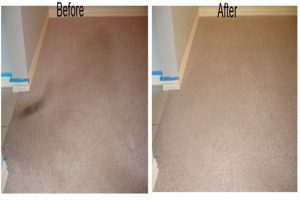
Q. Kindly give our readers an introduction to your business. Please include what your business is all about, in which city you are located and if you have offices in multiple locations/ cities.
A. CitruSolution Carpet Cleaning cleans carpet, rugs and upholstery. Our unique process is driven by a cleaning solution powered by two ingredients extracted from oranges, lemons, and grapefruit. It cleans better initially, dries faster, stays cleaner longer, and smells great.
We combine that with a level of pricing integrity that excludes upsells, fees, and any of the corrupt pricing strategies common to our industry. Our customer service starts with an educational approach to sales and includes a gift of a quart bottle of our CitruSolution Spot Cleaner which includes free refills for a year.
Our Company owned locations are in the North Metro Atlanta area, including Buckhead, Sandy Springs, Dunwoody, Alpharetta, Milton, Duluth, Berkely Lake, Sugarloaf, and Cumming Georgia.
We have franchisees across the United States, as well.
Q. Kindly give us a brief description about yourself (it should include your brief educational or entrepreneurial background and list some of your major achievements).
A. After serving three years in the U.S. Army I took some college courses, while working in several disciplines in the construction industry. The recession roller coaster that resulted in repetitive feast or famine cycles in the construction industry led me to consider and investigate various home service industries. I chose carpet cleaning because the processes were ineffective and unpopular with a large segment of homeowners. Pricing integrity was virtually nonexistent, as was responsive customer service.
My major achievement was creating a business model that afforded me an excellent quality of life, providing the income and the time to focus on the truly important things in life. Family, friends, and community.
As my clients recognized the value of that quality of life, more than thirty of them bought franchises, including five people whose parents were clients of mine. Many more clients and franchisees referred us to family and friends. Their enthusiasm for our business model built our company as it exists today.
Q. How did the idea for your business come about?
A. See above.
Q. What inspired you to (start a new business venture) or (to make significant changes in an existing business)?
A. When I turned thirty I decided I didn’t want to be a doctor, lawyer or an Indian chief. I was never happy as an employee working for someone with a different standard of ethics and behavior.
When someone tells me, ” I don’t know if they have what it takes to run a business”, I ask them if they have taken the test. They get excited thinking there is a test. I distract them from the subject, then ask them if they have ever said of their boss, “If that idiot can do it, I can”. They almost always say yes. I then tell them “ You passed the test. Now you will have to suppress your fear long enough to pull the trigger, then let it come rushing back in to motivate you to work harder than you have ever worked in your life.
I had repeatedly passed that test and decided to suppress my fear and take that leap. I was ready. A year later, in 1983, my wife quit her job and has worked side by side with me ever since.
Q. What three pieces of advice would you give to budding entrepreneurs?
1. Integrate with the community and be more of a value than just the service you provide.
2. Take the projects and passions in your life and incorporate them into your business.
3. Focus on your quality of life and enjoy the business experience.
Q. What would you say are the top three skills needed to be a successful entrepreneur?
A. Focus, tenacity, and adaptability.
Q. How many hours do you work a day on average?
A. Maybe eight hours each, my wife and I.
Q. To what do you most attribute your success?
A. Identifying our ideal target market. We market primarily in upper middle income communities. The rest either can’t afford us, or are too important for us to be important. People who have worked hard enough to attain an upper middle income level are more willing to pay a reasonable price for an excellent service.
Men schedule about 5% of our jobs. They are statistically irrelevant. Our marketing and procedures are designed to appeal to women, especially the nonconfrontational flat rate pricing policy.
Educating away our competition through our marketing and day to day interaction with our clients. We use a soap free cleaning process. Our favorite line is “If you think soap is good for your carpet, next time you shampoo your hair, leave the shampoo in your hair, and see how well that works”. Women usually laugh, but agree they would never do that. 95% of our competitors use a soapy process. What do you say to educate away 95% of your competitors? Client retention is enhanced by this humorous approach to marketing.
When someone asks us if we have any specials we respond “Everything we do is special. Let me explain”.

Q. How do you go about marketing your business? What has been your most successful form of marketing?
A. Myself and a large portion of our locations have been very effective using our face to face business networking, especially with real estate professionals. Reviews and testimonials driven by our unique process, pricing integrity, and customer service have been productive, as well.
Q. Where did your organizations funding/capital come from and how did you go about getting it? How did you obtain investors for your venture?
A. In 1982 I started with $3,200.00 and we have built our company through sweat equity.
Q. What is the best way to achieve long-term success?
A. Consistently providing a quality service or product that provides solutions to problems your clients face. Slick, deceptive marketing and procedures will leave with the task of constantly searching out fresh meat.
Q. Where do you see yourself and your business in 5 – 10 years?
A. At 66 I don’t see myself retiring any time soon. I love changing peoples lives, and I want to grow our program of discounting franchises for veterans and first responders.
Q. Excluding yours, what company or business do you admire the most?
A. Fuqua Industries. He developed a conglomerate and became an influential member of the community. He was a value to the community far above and beyond the services and products he provided.
Q. How important have good employees been to your success?
A. For me, it is my great vendors. They allow my wife and I to open and resupply locations with little to no staff.
Q. How long do you stick with an idea before giving up?
A. We have not had to do a lot of compromising or giving up.
Q. What motivates you?
A. If it was money I would have done this differently. Having survived 17 hours of brain surgery to remove a large tumor, I became aware how important the relationships I have created with so many people were to them and myself. It was like watching my own funeral without having to croak. I want to write a book titled It’s A George Bailey Life. ( See It’s a Wonderful Life.)
Q. What are your ideals?
A. I have a bumper sticker that says I love my wife. Others need not apply. I had them made many years ago. I strive to be the best husband, son, community member, citizen, and provider of business opportunity. I take care of people the best I can. My success is a result of creating momentum for other people. Their momentum creates a slipstream and they drag me along with them.
Q. How do you generate new ideas?
A. I am dyslexic. I see solutions to problems and challenges. Inventions, marketing, my Paulisms, my music, the many business models I’ve helped others with all come from my gift of dyslexia. I just try to let my unique brain lead the way.

Q. How do you define success?
A. Every person has their own definition. For me it is working side by side with my wife. Having had the time and resources to care for our parents in their declining years. Having had the opportunity and ability to guide so many people into business ownership, and watch them embrace and adopt the integrity and service spirit that drives our business model.
Q. How do you build a successful customer base?
A. We are a boutique carpet cleaning company. We do the fun, easy, profitable stuff. Our competitors try to be all things to all people. We skim the cream of the top of the market. Smart, educated, successful clients who appreciate all aspects of our client services. They repeat and refer at ridiculous rates. Do everything right and the success of the company will follow.
Q. What is your favorite aspect of being an entrepreneur?
A. The clout and connections you establish extend past your business reach. I remember when we got the call confirming that we had the votes to approve my initiative to build a $2,000,000 animal shelter, and an upgrade to our animal ordinance that would include, among other things, outlaw chaining a dog for life. My wife turned to me and said, “This is the most important thing you’ll ever do!”. That is debatable. We have had a great impact on issues affecting kids, vets, and pets.
Q. What has been your most satisfying moment in business?
A. I did my last franchise show in the spring of 2007. It was the first franchise show I had done since 1988. We don’t like to do those types of shows. A bunch of my franchisees showed up to help on their own initiative. The franchise people in the booth next to us waited until I took a break and then, in my absence, asked my people if they all worked for me, and how much they were they getting paid. They replied they are location owners and they are not getting paid. They asked why they were there. One of my people said we are here because we love Paul and Jessie, and we love what we do. During the show a stock fund manager talked to my self and my people at the show. Over the next few weeks he called all my location owners. He called me and said he wanted in. He wanted a location. I asked him if he had called all my owners. He said yes, and after talking to them he would do a handshake deal with me. Satisfying? Oh my God! To get that kind of validation of an ideologically driven way of doing business justifies all the extra effort.
Q. What do you feel is the major difference between entrepreneurs and those who work for someone else?
A. Your worst day working for yourself is better than your best day working for someone else. Most people will contemplate starting a business at some time in their life. The entrepreneur summons the courage to take the leap.
Q. What kind of culture exists in your organization? How did you establish this tone and why did you institute this particular type of culture?
A. When I open a new franchise, I sit the new franchisee down and I tell them “The only important things in life are family, friends and community. Money is only important if you haven’t figured out how to make it yet. I will help you make all the money you want to make. I won’t push you to make more than you want to make. Integrate with the community and be more of a value than just the service you provide. Take the projects you are passionate about and incorporate it into your business, and work takes a whole new importance and energy. My projects pivot around children vets and pets. What is yours?

Q. In one word, characterize your life as an entrepreneur.
A. SELF-DETERMINATION!
Q. If you had the chance to start your career over again, what would you do differently?
A. I would have created the franchise sooner.
Q. How has being an entrepreneur affected your family life?
A. My mom was the last of our parents to pass. She left me a note that said she knew she always relied on me for everything, but that was because I always let her know that she could. Time and resources. My siblings didn’t get that note. They had jobs.
Q. What is your greatest fear, and how do you manage fear?
A. I do my best and live with the rest. The rest is just problems waiting to be resolved. I didn’t even sweat brain surgery. What would being afraid accomplish. I just shot the, If you are watching this I didn’t make it videos, and hoped the important people in my life never had to watch them.
Q. How did you decide on the location for your business?
A. I went to do a franchise show in Atlanta, checked the place out, and kept it for myself. That weekend I landed the two Ritz Carltons as clients and moved there in1988. I built a huge client base, and broke the major metro market into 30 locations, kept five, and sold the rest to fund my expansion into a national franchise.
Q. Do you believe there is some sort of pattern or formula to becoming a successful entrepreneur?
A. I wish. It has always been individual effort. Always will be. People look at getting in an industry and mimic what everyone is doing. They are left to try and capture their statistical share of the market place. If I had to compete for my statistical share of a marketplace I would just shoot myself.
When I consult with someone relative to their business model we prioritize their offerings by what’s the most profitable, cross referenced by what is the most fun. Then we develop a marketing program focus on just those offering.
People worry too much about leaving money on the table. You have built a table. It’s your business. On that table there is a pile of dollars and a pile of pennies. Which one are you going to grab? If grabbing the pennies comes at the expense of picking up more dollars, a lesser overall profit margin, employee disdain for performing the penny services, providing great customer service, or worse, spending more time with your family, you might reevaluate your business focus.
Q. If you could talk to one person from history, who would it be and why?
A. Winston Churchill. Great orator and motivator who a majority of the world to defeat a terrible enemy.
Q. Who has been your greatest inspiration?
A. Americans. What an amazing story.
Q. What book has inspired you the most? (OR what is your favorite book?)
A. The one I will write someday.

Q. What are some of the biggest mistakes you’ve made?
A. When you need people to expand and you provide opportunity to people in a beneficent way, most people respond positively. Some
confuse kindness with weakness and do something unethical. If you view providing opportunity to what turns out to be the “wrong” person a mistake I guess that would be a mistake. A mistake I will surely make again. The people who would steal my “stuff” typically don’t have the integrity to make it work. I do my best and live with the rest.
Q. How can you prevent mistakes or do damage control?
A. Trust my wife’s instincts.
Q. What are your hobbies? What do you do in your non-work time?
A. Our 11 critters, our property, playing music.
Q. What makes you happy?
A. Working with my wife and the quality of our life. Helping people.
Q. What sacrifices have you had to make to be a successful entrepreneur?
A. Nothing significant, especially in comparison to the rewards.
